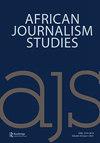非洲的数字扫盲:探索其与基础设施、政策和社会不平等的关系
IF 1.8
3区 文学
Q3 COMMUNICATION
引用次数: 0
摘要
在以技术为中心的当代世界,数字素养已成为个人不可或缺的能力,也是政府促进公平增长的当务之急。利用固定效应模型来分析...本文章由计算机程序翻译,如有差异,请以英文原文为准。
Digital Literacy in Africa: Exploring its Relationship with Infrastructure, Policy, and Social Inequality
Digital literacy has become indispensable for individuals in the contemporary techno-centric world and imperative for governments to promote equitable growth. Using the fixed effects models to anal...
求助全文
通过发布文献求助,成功后即可免费获取论文全文。
去求助
来源期刊

African Journalism Studies
COMMUNICATION-
CiteScore
1.90
自引率
10.00%
发文量
18
期刊介绍:
Accredited by the South African Department of Higher Education and Training for university research purposes African Journalism Studies subscribes to the Code of Best Practice for Peer Reviewed Scholarly Journals of the Academy of Science of South Africa. African Journalism Studies ( AJS) aims to contribute to the ongoing extension of the theories, methodologies and empirical data to under-researched areas of knowledge production, through its emphasis on African journalism studies within a broader, comparative perspective of the Global South. AJS strives for theoretical diversity and methodological inclusivity, by developing theoretical approaches and making critical interventions in global scholarly debates. The journal''s comparative and interdisciplinary approach is informed by the related fields of cultural and media studies, communication studies, African studies, politics, and sociology. The field of journalism studies is understood broadly, as including the practices, norms, value systems, frameworks of representation, audiences, platforms, industries, theories and power relations that relate to the production, consumption and study of journalism. A wide definition of journalism is used, which extends beyond news and current affairs to include digital and social media, documentary film and narrative non-fiction.
 求助内容:
求助内容: 应助结果提醒方式:
应助结果提醒方式:


